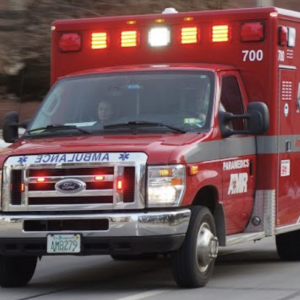There are no free rides. Not even to the hospital.
Which is why, for the second year in a row, New Hampshire lawmakers are grappling with how to reimburse ambulance companies for the services they provide without driving up insurance premiums for Granite Staters.
This time last year, New Hampshire Insurance Commissioner D.J. Bettencourt told NHJournal he was “deeply concerned” by a proposal to set commercial insurer reimbursement rates at 325 percent of Medicaid reimbursements. “There is no way you’re not going to see upward pressure on premiums,” he said at the time.
Today, that proposal is back. SB 245, introduced by state Sen. Suzanne Prentiss (D-Lebanon) would force insurers to reimburse a minimum of 325 percent of the Medicare rate for an ambulance ride, or the rate set by the local government (i.e. “current urban, rural, or super-rural Medicare rates based on the geographic area where the ground emergency ambulance service originated”).
And like last year, there’s also a bill to keep reimbursement costs lower in hopes of controlling insurance costs.
But this year, lawmakers have something they didn’t have before: data. A cost study report commissioned by the New Hampshire Insurance Department and the New Hampshire Health Plan.
The House passed HB 316 in a 250-185 voice vote last month. HB 316, introduced by Rep. John Hunt (R-Rindge), features rates in line with the recommendations made by the report. That means allowing ambulance companies to charge around 200 percent of the Medicaid rate as a base, plus 209 percent of the per-mile Medicaid rate.
“The study is not perfect, but it is a very solid foundation for us to better understand what the cost drivers are, what the budgetary pressures are for the EMS providers,” Bettencourt told NHJournal this week.
At the heart of the problem is the fact that 80 percent of all ambulance trips in New Hampshire involve a patient who is on either Medicaid or Medicare.
“Those rates are set, and the provider is not able to negotiate those rates,” Bettencourt said. “They’re set at the federal government level, and then with Medicaid, to a lesser extent, the state level, in terms of what the state wants to contribute towards those reimbursement rates.”
Unfortunately, Medicare only covers about 46 percent of what it actually costs to transport a patient via ambulance in most cases. Medicaid covers around 42 percent.
“So, what we have found is that in a good number of cases, what EMS providers are able to collect from Medicare and Medicaid is far short of what they need to be able to sustain their operations,” Bettencourt added.
Prentiss’ proposal ignores the cost study. Supporters of her bill include the New Hampshire Municipal Association, the New Hampshire Ambulance Association, and officials with Concord Community College’s (NHTI) Paramedic Emergency Medicine program. They all share a vested interest in the state allowing higher rates.
During a Senate Health and Human Services hearing held in February, Prentiss coined the legislation a “no surprises billing and system stabilization” act.
“Because that is what I’m proposing that we do here – that we prohibit balance billing,” Prentiss said during her testimony. “And in doing that, we work to stabilize the system by agreeing on a reimbursement percentage or rate.”
“This is all about consumer protections.”
Unless, opponents say, those consumers are small businesses with commercial insurance or Granite Staters who pay for their own healthcare costs.
Hunt described the Prentiss approach as “Let’s let all the suckers who happen to have insurance from their employers, let’s screw ’em,” he said during a committee debate.
“No, that’s not what we were going to do in the House Commerce Committee.”
Prentiss’ proposal is opposed by AHIP (formerly America’s Health Insurance Plans), a health insurance company trade association, and multiple providers, including Cigna, Anthem, and Harvard Pilgrim.
Chris Kennedy of Centene and Ambetter Health Plans testified against SB 245.
“First of all, at 325 percent, setting that rate as a floor, if we’re going to do some commercial rate setting, there should be some cost-based analysis that’s tied to it,” Kennedy said during a February hearing. “I’m certainly not going to sit in front of you and say there is not a problem.”
Critics of regulation mandating reimbursement rates object, not only on philosophical grounds, but also on the basis that bills like Prentiss’s amount to a mandate to fund the private equity industry, which has taken a major stake in many ambulance companies. In 2017, the venture capital firm KKR acquired AMR, the largest operator in New Hampshire, for $2.4 billion.
Bettencourt has refrained from criticizing Prentiss’ current plan and remained mum on whether he prefers the House proposal over the Senate plan. A Senate hearing report on SB 245 identified the New Hampshire Insurance Department as being “neutral” on the bill.
“Well, again, I think that what they represent are two sides of what is ultimately going to be a negotiation with an eye towards a compromise between those two numbers and what that looks like exactly,” Bettencourt said. “You know, I don’t know yet.
“There are, I think, some data points that we’re still waiting to see at this point.”





